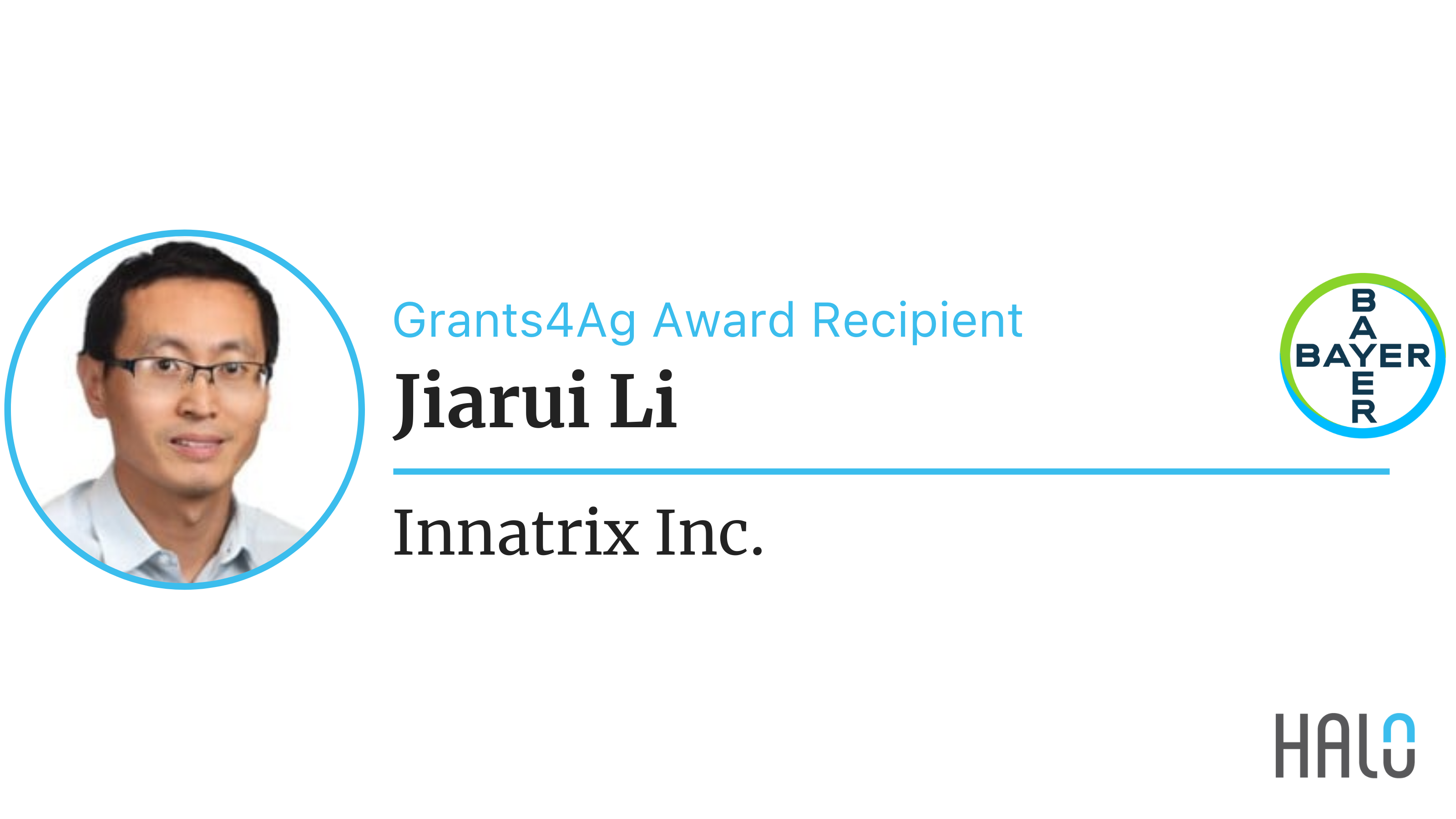Tackling pathogens, pests, and weeds is crucial for farmers, but using pesticides runs the risk of environmental damage and resistance issues. Dr. Jiarui Li and Innatrix are stepping up to the plate with a platform to develop ecofriendly biological solutions. View Halo Profile >>
Tell us about your research.
Innatrix is producing long-term, eco-friendly biological products to fight devastating pathogens. We are combining an understanding of the dynamics of pathogen-host interactions with patented protein evolution technology to develop novel biopesticides. By targeting critical pathogen virulence factors, we have identified our first peptide leads using phage display that inactivate those factors. We are confirming their effectiveness using in planta assays. To further optimize the peptide ligands to increase efficacy and manage pathogen resistance issues, we are developing a more advanced and higher-throughput continuous lab evolution system using a proprietary automation system named EvoStatTM. Currently, we have an initial proof of concept for the selection scheme used in the proprietary method (the T7 RNA polymerase evolution), which was patented in December 2020.
The platform enables Innatrix researchers to rapidly produce high-affinity, high-specificity protein ligands to target proteins of interest for agricultural applications.
Can you explain that to a non-scientist?
Innatrix is developing novel and sustainable biological products using a patent-protected platform for continuous laboratory evolution technology. The platform enables Innatrix researchers to rapidly produce high-affinity, high-specificity protein ligands to target proteins of interest for agricultural applications. The developed protein ligands will exert their effects by binding to cellular target proteins to make them malfunction. The target proteins cause cells to grow, move, and release other molecules. After binding to a ligand, they can be blocked from sending an undesirable signal to a cell. If a target protein and a ligand are a good fit, with matching nooks and crannies that allow them to bind together tightly, they’re considered high-affinity protein ligands.
Why did you choose this area of research?
Currently, chemical fungicides such as mandipropamid are being used to prevent late blight explosion. However, it takes more than 10 years and more than $250 million to develop one product. Due to resistance issues, these chemicals need to be rotated but still only provide partial control. And due to associated health concerns, the use of these chemicals must be limited in the field. Our peptide-derived biological products are eco-friendly since they are biodegradable. They also provide broad spectrum and specific control of late blight because we are using AI and machine learning to find conserved and specific targets in the pathogen. More importantly, we could manage disease resistance issues well because once we observe late blight has developed resistance in the field, we could rapidly develop a new product in one month. With the strength of team at Innatrix and commercial partners, we are confident to develop our product in 3 years with $3-4 million.
Our eco-friendly biological solutions will add great value to the fight in controlling pathogens, pests, and weeds.
How could your Grants4Ag project someday impact #healthforall #hungerfornone?
To the global community, this project’s success will provide an eco-friendly solution to control devastating late blight issue and increase farmers’ yield and profits with a minimum ROI of 2:1. The global crop disease control landscape is facing big challenges. Between 20-30% of the chemical pesticides in use will soon be banned due to health concerns, and pathogens rapidly evolve resistance to available chemical solutions. Our eco-friendly biological solutions will add great value to the fight in controlling pathogens, pests, and weeds. In the long term, our project’s success will help human society to reduce toxic chemical usage to build up a better earth ecosystem and to feed the world’s growing population sustainably.


